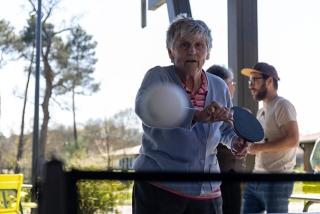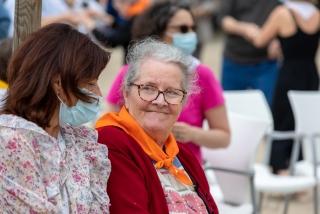Recreating everyday life in this Village also means changing attitudes to this disease. The Department has always shown its willingness to innovate and be at the forefront of the fields of education, social issues and helping the most disadvantaged. This village is a perfect example of this, providing a new solution to the care needs of these patients.
Xavier Fortinon, President of the Departmental Council of Landes
News
The foundation stone of the future Village Landais Alzheimer was laid on 4 June 2018 in Dax. The flagship project of the Departmental Council of Landes aims to take a new approach to this disease.
Multicoloured balloons in the sky, set-piece debates with a variety of guests and celebrities, and around 250 people to enjoy it all. Just down the road from the construction site, now home to diggers and clearance lorries. Monday 4 June will undoubtedly shape the life of the town of Dax, and beyond, with the symbolic laying of the foundation stone of the future Village Alzheimer, which is due to open in late 2019.
Started five years ago by Henri Emmanuelli and later managed by the Departmental Council of Landes, taking inspiration from an existing initiative in the Netherlands, this facility is designed to be an innovative model of care and support for people suffering from this disease. All participants applauded the tribute paid to the former President of the Departmental Council for his instincts and persistence in carrying out this project, which will remain one of the highlights of the Departmental Council’s term of office.
Xavier Fortinon, President of the Departmental Council of Landes, launches construction of the Village Landais Alzheimer
Research and innovation
‘Research’ and ‘innovation’ were two of the most used words in all the speeches and round-table discussions organised at this event. ‘This unique place is based on the concept of a village square. That’s why we’ve kept the square structure of the ’bastide landaise’, surrounded by four community homes’, explains Nathalie Grégoire, project architect. The four ‘neighbourhoods’, designed to house 120 patients, surrounded by 120 professionals and 120 volunteers, will be named after local areas: Haute Lande, Côte Atlantique, Chalosse and Bas Armagnac. This will, ‘as far as possible, keep residents in a familiar environment and promote independence’.
In the same vein, Professor Jean-François Dartigues, a neurologist at the University Hospital of Bordeaux, stresses that: ‘there is no research in the field of this disease. So combining this Village with research is a really bold move. And if it pays off, this Village will become a model to expand beyond Dax, all over France’.
Carers and families also have high hopes. ‘We’re expecting a lot of this Village’, says Françoise Diris, President of France Alzheimer Landes. Patients are never mistreated, but all too often, they’re not well treated either. With this Village, that must never happen again’.
For his part, Michel Laforcade, director of the Agence Régionale de Santé [Regional Health Agency], paid tribute to the ambition and commitment of all the project partners: ‘This is, first and foremost, a huge gamble, taking a risk on a humble and innovative approach’.
The other novel feature, the ‘trademark’ of the future Village, is, of course, the prominence of volunteers. They play a key role in involving residents in the outside world through various sports, leisure and cultural activities. ‘The volunteers, most of whom are from the community, provide a link between the Village and the outside world’, emphasises Florence Laudouar, Activities and Volunteer Coordinator of the Village. ‘Alongside multidisciplinary teams, they bring the Village to life’. This experience, carried out through awareness-raising of the disease and a volunteers’ charter, is the first of its kind in Landes. ‘It’s the start of a long journey and there’s still a lot to do, but we’ll make progress together’.
At a time when public spending is under scrutiny, creating this kind of public service at a local level, rather than an initiative coming from above, is a very positive thing. We’ll probably have to redesign our training plans for healthcare professionals.
Alain Rousset, President of the Nouvelle-Aquitaine Region
Kindness and humanity
Two other key words commonly used by participants were ‘kindness’ and ‘humanity’. Indeed, the project is based on these two concepts, both in form and in content. In some ways, they are its foundations. ‘I was immediately touched by the humanity of this project’, explains Michel Mompontet, a journalist at France 2, who has just published a book on the end of life of his mother, who suffered from the disease. Nathalie Grégoire, for her part, describes a ‘compassionate facility’ devoted entirely to patients’ needs while, later in the discussions, Xavier Fortinon, President of the Departmental Council, stressed ‘the caring nature of this project’.
It was Françoise Diris who made the best case for the use of these two words: ‘This Village will be their last home. It’s life’.
It’s a great day for Dax and the surrounding area. Of course, we must highlight the economic benefits, in terms of jobs and research. This facility will not be an isolated village; it will be open to the town and will, I hope, become a reference point’.
Elisabeth Bonjean, mayor of Dax, President of Grand Dax


